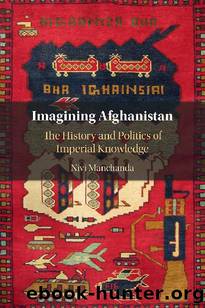Imagining Afghanistan by Nivi Manchanda

Author:Nivi Manchanda [Manchanda, Nivi]
Language: eng
Format: epub
Publisher: Cambridge University Press
Published: 2020-07-09T00:00:00+00:00
Conclusion
Through the particular articulation of the concept of âtribeâ, this discussion has sought to show that the discourse on Afghanistan is both typical and atypical of imperial modes of thought, and thus continues telling our âsame but differentâ story about Afghanistan. It is typical in that the notion of âtribeâ, not unlike those of âraceâ, âcasteâ and âethnicityâ found elsewhere in the colonies, has been mined and instrumentalised in the service of empire.149 This has far-reaching implications for the study of imperialism, and for knowledge production in global politics more generally, which resonates with important work done on colonial concepts, framing and imaginings. Tracing the genealogy of âtribeâ in Afghanistan, however, also reveals the ways in which Afghanistan as a discursive regime is exceptional. It is distinctive in the way it has been carved out in accordance with the cadences of colonial interest in the region. Unlike that expressed in colonial India, imperial interest in Afghanistan ebbed and flowed, alternating between long periods of apathy and short concentrated bouts of intense concern and involvement. As such, this has led to a sort of âemergency epistemeâ of the Afghan tribe, a familiar convocation of alterity at the behest of empire, but without the intellectual, economic and emotional energies that were expended in the construction of other idioms of difference such as race, caste and ethno-nationalism. Moreover, the colonial genealogy of this concept has been largely elided.
There has been a distinct paucity of resources devoted to studying the region and therefore only limited local knowledge, a lack (until recently) of any profound academic engagement with the country and, most importantly, a disconnect between practitioners, scholars and local populations. Even at the height of imperial involvement in Afghanistan, there were no monographic studies of tribes, few or no income and production surveys and no colonial ethnography on religious leadership and other networks of the kind that were vital in mobilising armed resistance to the British.150 Consequently, the imperative to churn out massive amounts of âknowledgeâ and be acquainted with the âfactsâ about Afghanistan â in a compressed period of time, for immediate political purposes â has become an enduring feature of âscholarshipâ on Afghanistan. As Anderson has indicated, nearly all the colonial ethnography that emerged on the North-West Frontier of British India, and Afghanistan more generally, was gathered, sifted and culled for political intelligence. In his own words: âin direct service of imperial design, it [the ethnography of the frontier] was a genuine handmaiden of imperialism by comparison to the camp follower of anthropological ethnographyâ.151 This accounts for the change in the literature from a state of multiplicity to one of conformity.152
Over time and with repetition, any nuanced appreciations of social relations, intuitive and incomplete as they may have been, gave way to a generalised and abstracted understanding of tribal or Afghan âcharacterâ that in effect was âa list of traits that only restated the problemâ.153 The abstracted conception of Afghan character came to figure prominently in the official colonial institutional memory, and
Download
This site does not store any files on its server. We only index and link to content provided by other sites. Please contact the content providers to delete copyright contents if any and email us, we'll remove relevant links or contents immediately.
| Africa | Americas |
| Arctic & Antarctica | Asia |
| Australia & Oceania | Europe |
| Middle East | Russia |
| United States | World |
| Ancient Civilizations | Military |
| Historical Study & Educational Resources |
The Story of China by Michael Wood(959)
Mr. Selden's Map of China by Timothy Brook(811)
Philippines--Culture Smart! by Culture Smart!(711)
Heroic Hindu Resistance To Muslim Invaders (636 AD to 1206 AD) by Sita Ram Goel(690)
Akbar: The Great Mughal by Ira Mukhoty(673)
First Platoon by Annie Jacobsen(664)
Vedic Physics: Scientific Origin of Hinduism by Raja Ram Mohan Roy(663)
The Meaning of India by Raja Rao(662)
Food of India by unknow(661)
Banaras by Diana L. Eck(650)
India--Culture Smart! by Becky Stephen(628)
China Unbound by Joanna Chiu(628)
North of South by Shiva Naipaul(626)
Mao's Great Famine: The History of China's Most Devastating Catastrophe, 1958-1962 by Frank Dikötter(608)
Insurgency and Counterinsurgency by Jeremy Black(595)
The Genius of China: 3,000 Years of Science, Discovery, and Invention by Robert Temple(594)
How to Be a Modern Samurai by Antony Cummins(587)
A History of Japan by R.H.P. Mason & J.G. Caiger(586)
The Digital Silk Road by Jonathan E. Hillman(580)
